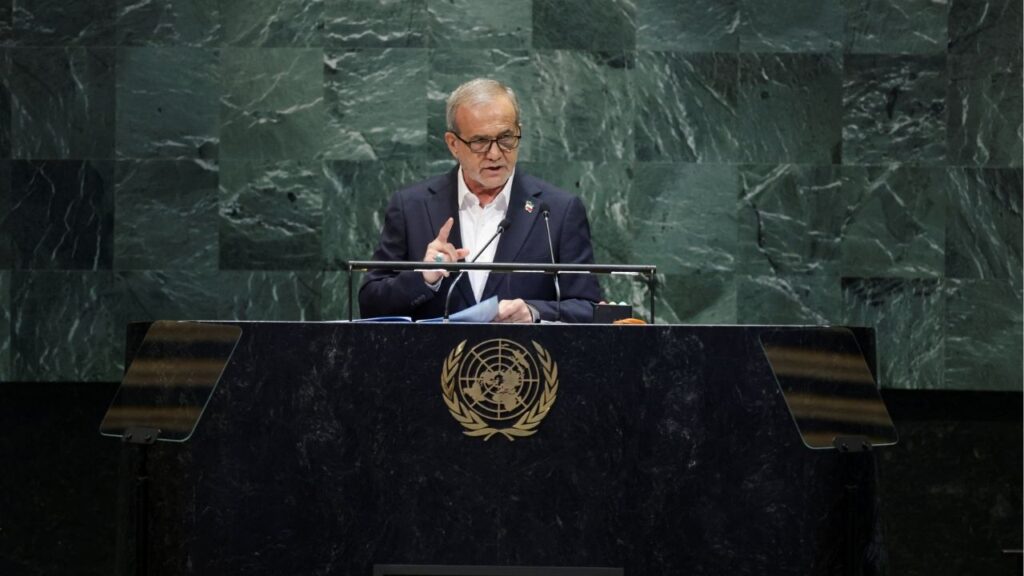Share
|
Getting your Trinity Audio player ready...
|
President George W. Bush and his administration put forward a variety of reasons to justify the 2003 invasion of Iraq.
In the months before the U.S. invasion, Bush said the looming conflict was about eradicating terrorism and seizing weapons of mass destruction – but also because of a “freedom deficit” in the Middle East, a reference to the perceived lag in participatory government in the region.
By Brian Urlacher
Opinion
Many of these arguments would emerge as poorly grounded, given later events.
In 2004, then Secretary of State Colin Powell reflected on the weak rationale behind the main arguments for the invasion: that there were weapons of mass destruction. He acknowledged that “it turned out that the sourcing was inaccurate and wrong and in some cases deliberately misleading.”
In fact, Iraq did not have a stockpile of weapons of mass destruction, as Powell and others had alleged at the time.
But the Bush administration’s rhetoric of building a more free, open, and democratic Middle East persisted after the weapons of mass destruction claim had proven false, and has been harder to evaluate – at least in the short term. Bush assured the American public in 2003 that, “A new regime in Iraq would serve as a dramatic and inspiring example of freedom for other nations in the region.”
He focused on this theme during the ground invasion, in which a coalition force of nearly 100,000 American and other allied troops rapidly toppled Saddam Hussein’s regime.
“The establishment of a free Iraq at the heart of the Middle East will be a watershed event in the global democratic revolution,” Bush said in November 2003. He also said that the U.S. would be pursuing a “forward strategy of freedom in the Middle East.”
Twenty years on, it is worth considering how this “forward strategy” has played out both in Iraq and across the Middle East. In 2003, there was indeed, as Bush noted, a “freedom deficit” in the Middle East, where repressive authoritarian regimes dominated the region. Yet, in spite of tremendous upheaval in the Middle East over the past two decades, many authoritarian regimes remain deeply entrenched.

Measuring the ‘Freedom Gap’
Political science scholars like myself try to measure the democratic or authoritarian character of governments in a variety of ways.
The non-profit group Freedom House evaluates countries in terms of democratic institutions and whether they have free and fair elections, as well as people’s civil rights and liberties, such as freedom of speech, freedom of assembly, and a free press. Freedom House rates each country and its level of democracy on a scale from 2 to 14, from “mostly free” to “least free.”
One way to think about the level of democracy in the region is to focus on the 23 countries and governments that form the Arab League, a regional organization that spans North Africa, the Red Sea coast and the Middle East. In 2003, the average Freedom House score for an Arab League member was 11.45 – far more authoritarian than the global average of 6.75 at the time.
Put another way, the Freedom House report in 2003 classified a little over 46% of all countries as “free,” but no country in the Arab League met that threshold.
While some Arab countries, like Saudi Arabia, were ruled by monarchies around this time, others, like Libya, were ruled by dictators.
The nearly 30-year-long regime of Hussein in Iraq fit this second pattern. Hussein was part of a 1968 coup led by the Ba’ath political party, a group that wanted all Arab countries to form one unified nation – but also became known for human rights violations. The Ba’ath Party relied upon Iraq’s oil wealth and repressive tactics against civilians to maintain power.
The fall of Hussein’s regime in April 2003 produced a nominally more democratic Iraq. But after fighting a series of sectarian insurgencies in Iraq over an eight-year period, the U.S. ultimately left behind a weak and deeply divided government.
Post-Invasion Iraq
The U.S. 2003 invasion succeeded in ousting a brutal regime – but establishing a healthy and thriving new democracy proved more challenging.
Rivalry between Iraq’s three main groups – the Sunni and Shiite Muslims as well as the Kurds, the largest ethnic minority in the country – paralyzed early attempts at political reorganization.
While Iraq today has a constitution, a parliament and holds regular elections, the country struggles both with popular legitimacy and with practical aspects of governance, such as providing basic education for children.
Indeed, in 2023, Freedom House continues to score Iraq as “Not Free” in its measure of democracy.
Since the U.S. military withdrawal in 2011, Iraq has lurched from one political crisis to another. From 2014 to 2017, large portions of western Iraq were controlled by the extremist militant Islamic State group.
In 2018 and 2019, rampant government corruption led to a string of anti-government protests, which sparked a violent crackdown by the government.
The protests prompted early parliamentary elections in November 2021, but the government has not yet been able to create a coalition government representing all competing political groups.
While Iraq’s most recent crisis avoided descending into civil war, the militarized nature of Iraqi political parties poses an ongoing risk of electoral violence.

Post-Invasion Middle East
While Iraq continues to face deep political challenges, it is worth considering the U.S. efforts at regional democracy promotion more fully.
In 2014, widespread protest movements associated with the Arab Spring toppled dictators in Tunisia, Egypt, Yemen and Libya. In other countries, such as Morocco and Jordan, monarchs were able to offer concessions to people and remain in control by delaying public spending cuts, for example, and replacing government ministers.
Yet sustaining stable democracies has proved challenging even where the Arab Spring seemed to succeed in changing political regimes. In Egypt, the military has reasserted itself and the country has slid steadily back to authoritarianism. In Yemen, the political vaccum created by the protests marked the start of a devastating civil war.
The average Freedom House democracy score for members of the Arab League is today 11.45 — the same as it was on the eve of the Iraq invasion.
It is hard to know if U.S. efforts at democracy promotion accelerated or delayed political change in the Middle East. It is hard to know if a different approach might have yielded better results. Yet, the data – at least as social scientists measure such things – strongly suggests that the vision of an Iraq as an inspiration for a democratic transformation of the Middle East has not come to pass.![]()
About the Author
Brian Urlacher is the department chair and a professor of Political Science & Public Administration at the University of North Dakota. This article is republished from The Conversation under a Creative Commons license. Read the original article.
RELATED TOPICS:
Categories

DHS Agent Killed US Citizen in March 2025, Records Show

Johannes Klaebo. Inevitable.

















